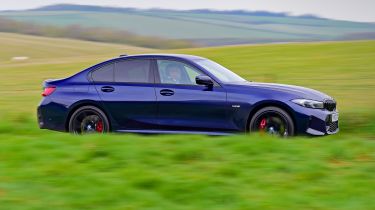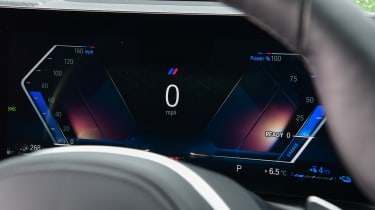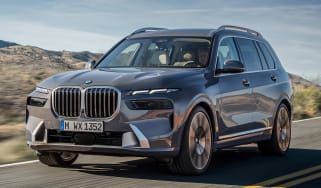BMW 3 Series - MPG, CO2 and running costs
Petrol and diesel versions have excellent economy and emissions, but the plug-in hybrid isn’t the cheapest company car to run

The latest 3 Series offers decent economy across the board, and CO2 emissions are relatively low – good news for private buyers and company car users. All quoted figures here are for the saloon – Touring estate buyers should factor in a slight dip in fuel economy and an increase in emissions because of the extra weight of its estate car body.
The 320d Sport is the most economical non-plug-in hybrid choice, with a claimed overall figure of 58.9mpg and CO2 emissions of 127g/km. Those seeking even more grunt won't be left with horrendous running costs because M340d xDrive manages to combine a 335bhp output with an outstanding 46.3mpg on the combined cycle, and emissions of 159g/km.
The most efficient of the petrol engines is the 320i Sport with a claimed 43.5mpg and 147g/km of CO2. The M340i, on the other hand, is the least efficient model in the range, with a claimed best of 34.9mpg on the combined cycle, and CO2 emissions of 182g/km.
The plug-in hybrid 330e is capable of travelling short distances without using any fuel – its 12kWh (11.15kWh useable) battery pack will provide up to 38.5 miles of electric range when fully charged. The 330e Sport has an impressive 217.3mpg maximum claimed economy and CO2 emissions as low as 30g/km – though you’ll be hard-pressed to match these figures in real-world driving.
Used - available now

2020 BMW
3 Series
38,618 milesAutomaticDiesel2.0L
Cash £19,103
2022 BMW
3 Series
67,585 milesAutomaticPetrol2.0L
Cash £16,111
2022 BMW
3 Series
79,213 milesAutomaticPetrol2.0L
Cash £13,990
2022 BMW
3 Series
32,791 milesAutomaticDiesel3.0L
Cash £33,990It’s definitely the best choice in the 3 Series range for company car drivers because of its relatively low Benefit-in-Kind (BiK) tax rates, but there are a number of alternatives that’ll be even more affordable to run, including the Mercedes C300e with up to 68 miles of electric range, or the all-electric Tesla Model 3, which sits in a low 2 per cent BIK band – at least until 2025.
Charging the 330e will take a little under four hours using a wallbox charger at home. It’ll only accept 3.7kW, which is a little behind the times when most plug-in hybrids can accept a charging rate of 7.4kW.
Insurance
Insurance groups for the 3 Series saloon and Touring models are competitive and range from 29 for the 320i in both Sport and M Sport trims, to group 42 for the M340d xDrive. As to be expected, the high-performance M3 sits in the highest insurance groups, with the hardcore M3 CS being the priciest in group 46.
Still, that’s better than the Tesla Model 3, which sits in the highest insurance group of 50, mainly due to its lightning-quick performance.
Check your tax status and renewal date in seconds. Check your VED car tax now...
Depreciation
Thanks to the lure of the premium badge, the BMW 3 Series has never suffered from terrible rates of depreciation, but as with the C-Class and the Audi A4, the sheer number of these premium models being sold each year has ultimately had a slight softening effect on their residual values.
The average retained value for the range after three years and 36,000 miles is around 50 per cent, with the strongest performer being the 320i petrol M Sport at 53 per cent, and the worst the 330e xDrive Sport at 45 per cent. The latter is probably due to company car drivers desiring the cheaper running costs of the Mercedes C300e plug-in hybrid, or the all-electric Tesla Model 3.
To get an accurate valuation on a specific model check out our valuation tool...










